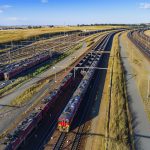The chickens have come home to roost
The chickens have come home to roost
The postponement of the 2025 Budget Speech due to opposition resistance to a VAT increase marked a turning point in South African politics. This highlights the crucial role of public consultation, a principle repeatedly overlooked in policymaking. As industries brace for uncertainty, SHARMINI NAIDOO says questions remain about government accountability and financial sustainability.
In a shocking, unexpected, and unprecedented announcement, the 2025 Budget Speech was postponed to 2 March due to opposition parties not being in support of a 2% VAT increase. This increase would have resulted in the budget vote not being approved by parliament. The Minister of Finance is now required to engage in further consultations with the GNU parties. In the past, the minister would have simply presented their budget and it would have been supported and passed with the ANC’s majority vote.
With this decision being heralded as “a victory for the people of South Africa”, it is safe to say that, alas, the chickens have come home to roost! Perhaps it’s about time that the government learnt this very embarrassing lesson, as it faces the perils and consequences of a lack of adequate and proper consultation and gets its house in order.
SABOA has repeatedly raised the issue of the lack of proper consultation on almost every piece of legislation that has been published for comment – where stakeholders are not properly consulted but merely subjected to info sessions so that the government can force legislation through. This is a far cry from the intention of the South African Constitution.
The Constitution requires public consultation in law-making and policy formulation at all levels of government. This is to ensure that decisions are legal, rational, and reflect the will of the people. Sections 59(1)(a) and 72(1)(a) require consultation in law-making and are very clear that public participation must be adequate and deliberate for decisions and policies to be legal and rational.
Consultation is not a sheer formality
Consultation “is not meant to be an inconsequential process or a sheer formality”. Rather, it is meant to “facilitate a festival of ideas that would hopefully provide some enlightenment on stakeholders’ perspectives, ensuring that policy formulation is as informed as possible” for the good of society.
According to Reuben Masango, associate professor at Nelson Mandela University, consultation is intended to demonstrate the legitimacy of public decision-making and is one of the key public participatory mechanisms mandated in the Constitution. It builds trust with affected parties and furthers the rule of law. Our Constitution “makes it pertinent that in any form of decision-making or policy formulation, adequate and deliberate consultations and by extension, public participation must have been conducted in order for such decision or policy to pass the test of legality and rationality”.
The Organisation for Economic Co-operation and Development (OECD) also notes that consultation processes, when properly conducted, can enhance voluntary compliance, both by forewarning people of what is to come and, more importantly, because consultation gives rise to a sense of legitimacy and shared ownership that motivates parties to comply, which undoubtedly enhances the rule of law.
Section 15A(2) of the Employment Equity (EE) Amendment Act mandates the setting of numerical sector targets to address the under-representation of designated groups of the workforce in the workplace. In accordance with this, the Department of Employment and Labour recently held “consultations” with various sectors, including the transportation and storage sector (of which the bus industry is a part) to discuss the proposed sector numerical EE targets before publishing the final targets for implementation.
The “consultation” lasted for just over an hour and informed stakeholders that they only had a week and a day to submit their comments. After the presentation of the proposed targets and the rationale, questions were limited. Participants were not allowed to properly engage on questions of clarity and most of the enquiries were met with aggression and disregard for the challenges faced by the industry. This is yet another example of the association’s experience of so-called “consultation”, which we believe does not meet its definition or fulfil the requirements of the Constitution.
Legal framework for the National Budget
The process for tabling the annual budget is governed by our Constitution, the Public Finance Management Act (PFMA), and various parliamentary rules; National Treasury is supposed to prepare a draft budget in consultation with government departments, and the minister then delivers the budget speech outlining the proposed budget for the year. This details the government’s proposed spending, revenue collection, and tax adjustments, and is scrutinised by parliament after being delivered. If approved, parliament then passes relevant bills, such as the Appropriation Bill and the Taxation Laws Amendment Bill.
“A delay in introducing a budget could now have a knock-on effect in terms of the entire budget process and could potentially impact government funding and allocations for important functions and services performed by the State,” notes respected law firm Cliffe Dekker Hofmeyr.
In the past, government departments have “borrowed” from the new budget allocations to meet the obligations of the previous year for bus operator payments, so we hope that the industry will not bear the consequences of the postponed budget.

Why did the Budget cause such controversy?
The key bone of contention was a 2% VAT increase which would have raised R58 billion in revenue. This followed revenue projections that fell short of forecasts by R19.3 billion. Increasing VAT instead of personal income tax has always been discussed during the tenures of various finance ministers, but was always met with caution (especially in voting years). Excessive and exorbitant expenditure that government could not curtail seems to have swayed their thinking this time around.
The proposed VAT increase was to fund wage increases for civil servants; fund early childhood development; retain teachers and doctors; pay for essential frontline workers; pay to fix commuter rail; and provide above-inflation grant increases, according to circulated Budget documents. If government cannot afford this, then how can a subsidy policy propose a user subsidy that will cost in the region of R231 billion and the nationalisation of all transport infrastructure (such as depots) and assets (buses and taxis), which we estimate will cost about R252 billion for the current buses and taxis in operation? Yet we continue to see ambitious policy proposals that may never materialise and could be inherently unfeasible.
In terms of the draft public transport subsidy, all the infrastructure – including non-motorised transport infrastructure and rolling stock operating on the subsidised network – will be financed and owned by the state, and managed through an appropriate contract. This moves away from government policy to have more private sector involvement and participation. Naturally, this poses a major threat to operators and the industry is extremely concerned.
Gauteng negotiated contracts
The self-review application by the Gauteng Department of Roads and Transport (GDRT) to set aside the negotiated bus contracts is another example of insufficient funding. Some of the Gauteng operators were also given notice of penalties which would have resulted in reduced subsidy payouts. This was a result of the implementation phase-in plan by the GDRT that was not approved by the operators.
The phase-in plan included the restriction on the limitation of buses older than 13 years. Legal action by one of the operators subsequently prompted the department to withdraw the instruction and not reduce payment. While litigation does not come cheap and should always be the last resort, time and again the industry has had to resort to reliance on the legal route to resolve disputes and be treated fairly.
KZN bus operators
For some background: over 10 years ago, the KZN Department of Transport (KZN DoT) began negotiations with operators that resulted in seven-year contracts being concluded for Phase 1. When it was time to implement Phase 2, the KZN DoT decided to renegotiate Phase 2. Affected operators then started legal proceedings (over 4 years ago) to ensure that Phase 2 was actually implemented. As a result of an earlier high court ruling, the province was compelled to extend the contracts in their present form until it is ready to implement transformation and the final actioning of the agreed percentages.
In a parallel process to keep the matter in abeyance, the KZN MEC for Transport and Human Settlements created a joint task team for both buses and taxis to negotiate. The task team resumed negotiations for up-to-date costings and submitted the same to the department – pending finalisation and signing of the negotiated contracts. The court proceedings have been put on hold to allow the department and the operators to conclude the negotiated contracts. Due to the change in government leadership, the process has come to a halt. In a sudden change of mind, the department now wants the matter to proceed in court. Representation to the court has been made and a date to proceed has been finalised by the Judge President.
At the moment, operators are running on six-month contracts pending the finalisation of the court proceedings. The current contracts come to an end on 31 March this year. As you can imagine, it is extremely problematic to obtain permits every six months, as there are knock-on effects down the line – for example on the certificate of roadworthiness (CRW). In terms of the National Road Traffic Act, a bus must be tested for roadworthiness every six months; this is not only costly but also extremely onerous for operators.
In eThekwini, both taxi and bus operators are awaiting the Tactical Adjustment approved by the city. The city recently published its Comprehensive Integrated Transport Plan (CITP), on which SABOA commented extensively and is still awaiting feedback.
The city is also in the process of undertaking surveys on all existing operations, facilities, and routes to update the CITP. This would provide both the city and the operators a clear picture of the current status quo, as well as satisfy the CITP requirements. This public transport data collection process is expected to take three years to complete. This is very proactive of the city and we look forward to reviewing the outcome of the surveys.
Published by
Sharmini Naidoo
focusmagsa




